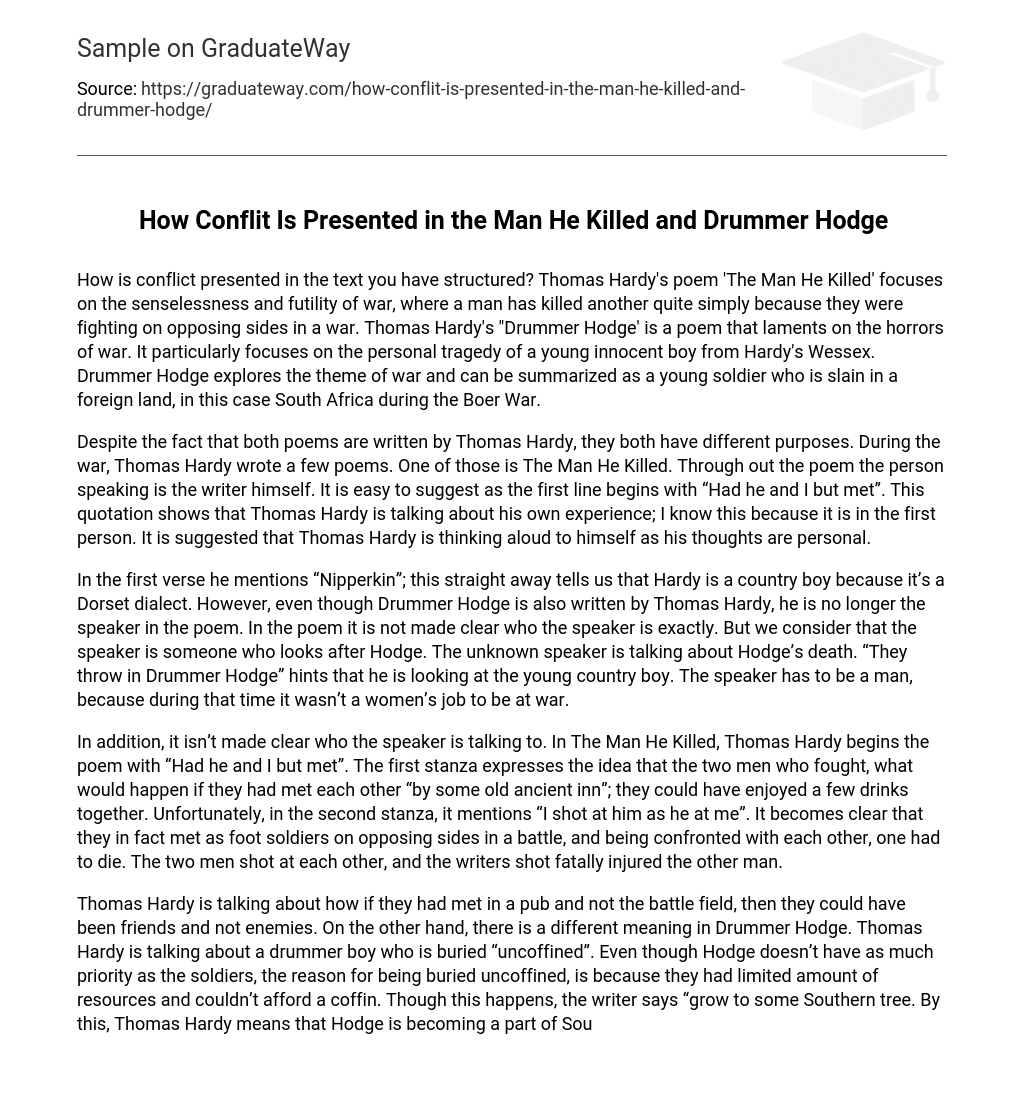How is conflict presented in the text you have structured? Thomas Hardy’s poem ‘The Man He Killed’ focuses on the senselessness and futility of war, where a man has killed another quite simply because they were fighting on opposing sides in a war. Thomas Hardy’s “Drummer Hodge’ is a poem that laments on the horrors of war. It particularly focuses on the personal tragedy of a young innocent boy from Hardy’s Wessex. Drummer Hodge explores the theme of war and can be summarized as a young soldier who is slain in a foreign land, in this case South Africa during the Boer War.
Despite the fact that both poems are written by Thomas Hardy, they both have different purposes. During the war, Thomas Hardy wrote a few poems. One of those is The Man He Killed. Through out the poem the person speaking is the writer himself. It is easy to suggest as the first line begins with “Had he and I but met”. This quotation shows that Thomas Hardy is talking about his own experience; I know this because it is in the first person. It is suggested that Thomas Hardy is thinking aloud to himself as his thoughts are personal.
In the first verse he mentions “Nipperkin”; this straight away tells us that Hardy is a country boy because it’s a Dorset dialect. However, even though Drummer Hodge is also written by Thomas Hardy, he is no longer the speaker in the poem. In the poem it is not made clear who the speaker is exactly. But we consider that the speaker is someone who looks after Hodge. The unknown speaker is talking about Hodge’s death. “They throw in Drummer Hodge” hints that he is looking at the young country boy. The speaker has to be a man, because during that time it wasn’t a women’s job to be at war.
In addition, it isn’t made clear who the speaker is talking to. In The Man He Killed, Thomas Hardy begins the poem with “Had he and I but met”. The first stanza expresses the idea that the two men who fought, what would happen if they had met each other “by some old ancient inn”; they could have enjoyed a few drinks together. Unfortunately, in the second stanza, it mentions “I shot at him as he at me”. It becomes clear that they in fact met as foot soldiers on opposing sides in a battle, and being confronted with each other, one had to die. The two men shot at each other, and the writers shot fatally injured the other man.
Thomas Hardy is talking about how if they had met in a pub and not the battle field, then they could have been friends and not enemies. On the other hand, there is a different meaning in Drummer Hodge. Thomas Hardy is talking about a drummer boy who is buried “uncoffined”. Even though Hodge doesn’t have as much priority as the soldiers, the reason for being buried uncoffined, is because they had limited amount of resources and couldn’t afford a coffin. Though this happens, the writer says “grow to some Southern tree. By this, Thomas Hardy means that Hodge is becoming a part of South Africa because his body is decomposing with the soil.
Thomas Hardy is talking about how Drummer Hodge became apart of a foreign land without understanding the language or the environment. Feeling – Thomas Hardy falters at the end of the opening line of the third stanza as he tries to justify his action. Repeating the word ‘because’, he states that he had to kill the other soldier since he was his enemy. The third line of this stanza features more repetition, this time of the word ‘foe’; the use of phrases suggests that the narrator is trying to convince himself that his action was inevitable.
The stanza, however, ends with the word ‘although’, telling us that the writer is not in fact at ease with the idea that he has killed his enemy. Using enjambment to link to the fourth stanza, the narrator reflects on the fact that the soldier he killed probably decided to join the army, because he had no work and had sold his belongings. The narrator understands this, having been in a similar situation himself and having found himself with no alternative but to join the army. It was not a positive decision, but a last resort when there were no other options. From this, it’s clear to sense that the writer is feeling guilty.
Similarly in Drummer Hodge, the writer is also feeling the same regression feeling. Drummer Hodge accepts to leave his “Wessex home” to go to a foreign land (South Africa). The writer feels sympathy for Hodge, because he dies instead of the soldiers. Thomas Hardy shows the feeling of regression that Hodge decided to drum the soldiers into battle in a foreign land where he didn’t understand any of the landscapes or the language. It is easy to appreciate and identify the poem and to identify the soldier and his feelings in “The Man He Killed”, sympathizing with his predicament and sensing that he regrets having to kill his enemy.
Thomas Hardy exposes this feeling throughout the poem. “I shot him dead because-“, this quotation makes it clear to the audience that he is hesitating, because the dashes show he’s pausing. His hesitation shows that Thomas Hardy is lost with words, because he’s confused as to why he killed the other man. On the contrary, Drummer Hodge is also shown with the similar feeling. In Drummer Hodge, the poem of the structure shows that Hodge is confused, because between each stanza there’s a big gapping space. This could show that Drummer Hodge is alienated in a big foreign land.





